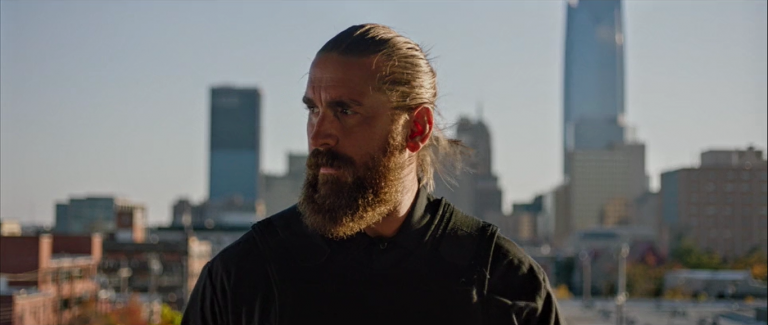In the aftermath of the critical praise that greeted ”The Social Network,” Hollywood seemed to take the wrong lessons from David Fincher’s generational masterpiece. “The Social Network” explored a reckoning within society, examining how the shift to digital interactions simultaneously brought people closer together while dividing them even further. Although there were certainly some interesting notes about the origins of one of the most influential platforms in modern tech, it would be false to claim that “The Social Network” succeeded because it explored the murky origins of a popular website.
In the fifteen years since the release of “The Social Network,” Hollywood has produced origin stories for numerous products, brands, and social platforms. Unfortunately, many of these stick to a rather predictable routine in which a novelistic creator is pushed out by the corporate system, a company’s original intentions are subverted, or the changing media landscape makes all the previous efforts irrelevant. While “Swiped” is mostly entertaining thanks to the terrific lead performance by Lily James, its familiarity makes it feel completely out of touch.
What’s unfortunate is that the story at the heart of “Swiped” is slightly more interesting than other tech startup narratives. James stars as Whitney Wolfe Herd, a quick-witted and ambitious young entrepreneur and marketing specialist who helped turn the dating app Tinder into a phenomenon for young people. Herd had initially been hired by Match Group founder Sean Rad (Ben Schnetzer) to rectify the struggling Cartify brand, but her insights on how to make online dating a priority for college-age students completely transformed the company’s standings. Although Herd was responsible for a vast majority of Tinder’s growth, she never received credit for her contributions and left the company on unceremonious terms.

Herd’s journey from a novice whiz kid to a leading businesswoman and eventual CEO is a fascinating one, but “Swiped” doesn’t give itself much breathing room to explore the complexities of each development. Rarely does the film get any deeper than a Wikipedia article that summarizes familiar talking points about Herd’s marketing efforts. A key sequence in the middle of the film seems to imply that it took a single visit to Texas’ Southern Methodist University to get college students interested in the notion of meeting people online. The constant emphasis on summarizing key details makes “Swiped” feel largely unfocused, as the interiority of Herd’s interpersonal relationships is treated with the subtlety of a sledgehammer.
Given that both Tinder and Bumble are dating apps, it would make sense for Herd’s romantic relationships to occupy a prominent focus within “Swiped.” However, Herd’s toxic relationship with Justin Mateen (Jackson White) adheres to such conventional foreshadowing that there is little suspense to the professional feud that will engulf them. Even if a biographical film has to stick to the basic facts about Herd’s life, other tech dramas in the wake of “The Social Network” were still able to provide insights into what market fluctuations caused certain companies to rise to the top. When compared to the high-pressure anxiety of “Blackberry” or the sardonic wit of “Dumb Money,” the internal turmoil in “Swiped” is completely flat.
It doesn’t help that none of the supporting characters in “Swiped” exist other than to give Herd the opportunity to launch into self-reflective speeches in which she reaches some form of discovery about the ideology of her company’s mission statement. Although White can’t entirely be blamed for an underwritten role, the lack of any chemistry between him and James makes the romantic connection between Herd and Mateen ring particularly false. Schnetzer, a gifted actor who has been oddly absent from the industry in the wake of his stellar turns in “Snowden” and “The Life and Death of John F. Donovan,” is also saddled with a difficult role, as Rad’s transformation from a seemingly progressive young influencer to a slimy businessman feels all too abrupt.
There’s also a bizarre appearance by Dan Stevens as Andrey Andreev, a Russian investor who helps Herd break from Tinder to start Bumble, an alternative dating app that focuses on positive experiences for female users. Stevens’ strange Russian accent and idiosyncratic mannerisms feel lifted from a more self-aware, Adam McKay-esque “ripped from the headlines” biopic that broke the fourth wall and addressed its narrative conventions. It’s entertaining enough to watch Stevens act in his own reality, but his whimsical performance is another reminder of how routine the rest of “Swiped” feels.

Herd’s characterization is dramatically uninteresting, as the film seems to lionize her achievements, and even her admissions of fault seem intended to score points with forward-thinking viewers. That being said, James is genuinely terrific in the role, making it very easy to invest in her rise, fall, and resurgence. Although the suggestion that Herd’s biggest vice was that she put too much personal stake into her products may have felt irritating, James turns a potential narrative misstep into a compelling character choice. For better or worse, the film implies that Herd’s livelihood and self-satisfaction were tied directly to the market success of her assets.
“Swiped” finds its footing when detailing the specific differences between Tinder and Bumble, and does make some interesting points about the psychology behind online dating. It’s easy to forget that finding partners online was once considered a reductive, desperate choice for singles who had no hopes of meeting people otherwise. However, any explorations of the app in action feel largely unnecessary. Given the vast swath of users who had wildly different experiences, it seems shallow to condense the film’s focus to just a few examples.
The blurred line between cinematic, television, and streaming releases makes it hard to judge a film like “Swiped.” Even if it does boast some impressive stars and clearly had the budget to use recognizable needle drops, everything about the film’s production feels like the type of television event production that was common on HBO or TNT in the early 21st century. That doesn’t mean that “Swiped” should be lambasted for its more modest ambitions, but the film does little to justify its choice of medium. A more artistically minded film or prestige miniseries may have done this story justice, but “Swiped” feels too much like a quick means of replicating an already outdated trend.








